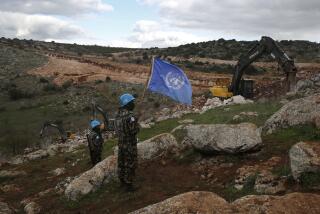Unarmed Monitors Put Their Lives on Firing Line in Kosovo
- Share via
WASHINGTON — It is a new experiment designed to contain Europe’s virulent ethnic conflicts, a flicker of hope for a more peaceful future. However, in the test tube called Kosovo, it’s off to an uncertain start.
Veteran U.S. diplomat William Walker, head of an international group of several hundred experts charged with verifying the shaky cease-fire between government troops and ethnic Albanian rebels in the Yugoslav province of Kosovo, calls his experimental mission “too important to be allowed to fail.”
At the same time, he acknowledges that it is extremely vulnerable and could easily be undermined.
The peace monitors, in effect the world’s first unarmed and largely unprotected international referees in a simmering ethnic conflict, are drawn from 34 nations and include experts in the fields of the military, police, human rights and peacekeeping. Despite their lack of protection, monitors venture into often remote, hostile areas to determine who fired the first shots in each new skirmish and to persuade both sides to stop killing each other.
It is nerve-racking work.
“It’s a real tough situation,” Walker said this week in an interview with reporters from The Times’ Washington Bureau. “We’ve got a lot of people in there, and we’ve got almost no security for them. This is something that’s never been tried before, and there are a lot of risks for a lot of people, for a lot of governments.”
The risks to the monitors are especially high in an environment that Walker maintains has been poisoned with Yugoslav propaganda denouncing the mission as de facto support for ethnic Albanian guerrillas seeking independence for Kosovo. In addition, virtually everyone in the province carries some form of weapon.
“We must be the only unarmed people in the country,” said Walker, a Los Angeles native.
There also are dangers to the mission itself, including the political fallout from possible casualties among nationals from Western countries, where support for interventions in such troubled lands is both fragile and shallow.
“Almost all the countries contributing [personnel] say if any of their people gets killed, they’re going to have to pull out,” Walker said.
There are about 600 monitors working in Kosovo, which is in Serbia, the dominant republic in the Yugoslav federation. About a third of those are Americans. Walker said he expects the force to grow to about 1,500 by next month.
The cease-fire accord negotiated in October between U.S. envoy Richard C. Holbrooke and Yugoslav President Slobodan Milosevic calls for an eventual buildup to 2,000 personnel.
The stakes are politically high because the mission takes the monitors into uncharted waters as nations search for new ways to choke off one of the most serious post-Cold War threats to global stability: ethnic war.
For example, it marks the first use of entirely unarmed, impartial international observers to verify an unstable, unpredictable cease-fire. At one point last month, Walker said, monitors were dispatched to both a Serbian military unit and an Albanian guerrilla group that had squared off against each other north of Pristina, the provincial capital. The monitors first chronicled the exchanges of fire, then persuaded the two sides to break off contact.
By acting in such incidents, the monitors are helping to build confidence in negotiations for a permanent settlement of the emotive issues that divide ethnic Albanians, who make up 90% of the province’s population, from Serbs.
The mission constitutes a new task--and new test--for the Organization for Security and Cooperation in Europe, a group of more than 50 nations, including the United States and Canada, charged with running the Kosovo Verification Mission.
Although Milosevic has backed last fall’s cease-fire agreement, Walker said the Yugoslav leader has repeatedly complicated the mission’s work. Milosevic turned down requests to bring in a medical evacuation helicopter from Switzerland and to allow in a limited number of side arms to enhance security for monitors.
Perhaps more ominously, Walker said he is especially pessimistic about the progress of negotiations between ethnic Albanians and Serbs in their search for a permanent settlement. U.S. Ambassador to Macedonia Christopher Hill is presiding over those talks.
“The negotiating process is moribund right now,” Walker said.
More to Read
Sign up for Essential California
The most important California stories and recommendations in your inbox every morning.
You may occasionally receive promotional content from the Los Angeles Times.













